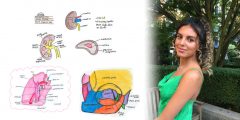Fundraising for the Medic’s Musical 2022/23: RENT
October 17, 2022
As many of you will know, Nottingham Medical School has a long-standing beloved tradition of performing a musical of choice. My name is Ïa and I am the Producer of this year’s Medic’s Musical – to be performed by our penultimate year medical students in March 2023. Here’s our go-fund-me if you’d like to give …
What is the RAPID Eczema Trials project?
August 23, 2022
Researchers always wear white lab coats? Obviously, that is a stereotype, which is seldom correct. They are generally indistinguishable for the rest of the population. Open minded, curious, careful and rigorous. And with this “citizen science” project, the researchers can be anybody who has lived experience of eczema. Amazement, disbelief and excitement hit all of …
50 at 50: Students for Global Health
January 28, 2022
Consider the following facts. Greta Thunberg and Malala Yousafzai are names that have become just as recognisable as Hugh Grant and Taylor Swift. All 10 of the Guardian’s most powerful images of 2021 depict the impacts of global health crises. More than half of young people across the UK report experiencing some degree of anxiety …
50 at 50: Alumni 40th Year Reunion Tour at the Medical School
December 3, 2021
On Saturday 13th November, the School of Medicine was honoured to host an event for an alumni gathering. The group had got in touch and asked if it was possible to have a tour of the Medical School as they were holding a 40th Year Reunion in Nottingham. The arrangements were put in place by Julie Hall, and involved …
50 at 50: Life Lessons From A Current Medical Student
October 8, 2021
As you approach your first day of medical school, many of you will be excitedly (or nervously) looking up videos on whether to use Anki or Quizlet, reading blog posts of people telling you you don’t need a colander, and trying to figure out whether those nightclub tickets you bought are a scam or not. Although the advice in this blog may not seem like the information you …
50 at 50: Reflections on a year of Covid-19 from a clinical academic perspective
September 3, 2021
A new disease…, a new patient group…, new clinic requirements … and of course new opportunities for clinical research…, there is nothing like a pandemic to jolt a clinical academic who had been focusing primarily on one long-term lung disease and thought she had the next few years worth of research mapped out. Whilst the onslaught of severely ill patients with Covid-19 admitted to …
50 at 50: Transforming healthcare: High explosive treatment for treatment of stroke
July 9, 2021
I have been in Nottingham since 1998 having previously been a Clinical Lecturer then Senior Lecturer in South-West then South-East London. My research and clinical interest in nitric oxide, a gas comprising a molecule of just one oxygen and nitrogen atom, started when working for my MD postgraduate research degree at the “University of Beckenham”, …
50 at 50: Tamra’s Notes
May 28, 2021
Starting Medical School I was nervous about the concept of full body dissection. I had shown preference for it across the board in my application, but without any real understanding of what it would mean to me to be in a room full of cadavers. In year one I struggled with the sheer volume of work and attention to detail that Anatomy demanded. …
50 at 50: The experience of undertaking CP1 during the Covid-19 pandemic
May 7, 2021
Clinical placement is a time for us medical students to put into practice all of the skills and academic knowledge we have learnt to date. Additionally, it is a time to realise that when you’re asked a question when you first start on the wards, no matter how simple it is, your mind will go …
The Dragon In My Skin: book, animation, and resource pack for schools to raise awareness about life with eczema and encourage self-care
April 26, 2021
Stephanie Lax from the Centre of Evidence Based Dermatology has been proud to work with Professor Fiona Cowdell and colleagues from the School of Education at Birmingham City University (BCU) and local professional orchestra Sinfonia Viva on an artistic outreach project resulting in a children’s book, film, and resource pack for Key Stage 1 teachers. …










